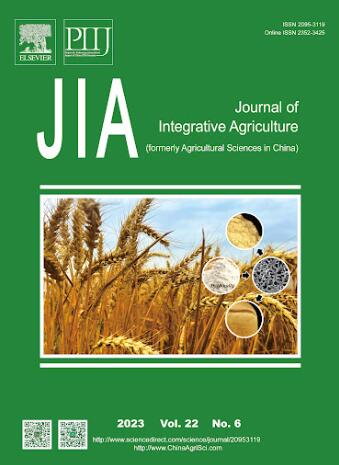果胶甲基酯酶抑制剂 GhPMEI53 和 AtPMEI19 通过调节棉花和拟南芥细胞壁的可塑性提高种子萌发率
IF 4.4
1区 农林科学
Q1 AGRICULTURE, MULTIDISCIPLINARY
引用次数: 0
摘要
种子的萌发过程受到果胶甲基酯酶(PME)和果胶甲基酯酶抑制剂(PMEI)这两个对立因子之间相互作用的影响,它们共同调节果胶甲基酯化的模式。尽管果胶甲基化在种子萌发过程中的重要性已得到公认,但调控这一过程的具体机制仍不清楚。在这项研究中,我们证明了 PME 的过表达与 PME 活性的降低和果胶甲基化的增加有关。这导致了种子细胞壁的软化,从而对棉花种子的萌发起到了积极的调节作用。与 GhPMEI53 同源的 AtPMEI19 与 GhPMEI53 在种子萌发中的作用相似,表明 PMEI 在种子萌发调控中的功能和机制是保守的。进一步研究发现,GhPMEI53 和 AtPMEI19 通过诱导细胞壁软化和降低机械强度,直接促进胚根突起和种子萌发。此外,转基因材料中 ABA 和 GA 的作用途径也发生了显著变化,表明 GhPMEI53/AtPMEI19 介导的果胶甲基酯化作用是参与种子萌发的相关植物激素的调控信号。总之,GhPMEI53 及其同源物会改变细胞壁的机械特性,影响胚乳或种皮的机械阻力。此外,它们还影响细胞植物激素途径(如 ABA、GA),从而调节种子萌发。这些发现加深了我们对果胶甲基酯化在细胞形态动力学和信号转导中的作用的理解,有助于我们更全面地了解植物中的 PME/PMEI 超级基因家族。本文章由计算机程序翻译,如有差异,请以英文原文为准。
Pectin methylesterase inhibitors GhPMEI53 and AtPMEI19 improve seed germination by modulating cell wall plasticity in cotton and Arabidopsis
The germination process of seeds is influenced by the interplay between two opposing factors: pectin methylesterase (PME) and pectin methylesterase inhibitor (PMEI), which collectively regulate patterns of pectin methylesterification. Despite the recognized importance of pectin methylesterification in seed germination, the specific mechanisms that govern this process remain unclear. In this study, we demonstrated that the overexpression of is associated with a decrease in PME activity and an increase in pectin methylesterification. This leads to the softening of the cell wall in seeds, which positively regulates cotton seed germination. AtPMEI19, the homologue in , plays a similar role in seed germination to GhPMEI53, indicating a conserved function and mechanism of PMEI in seed germination regulation. Further studies revealed that GhPMEI53 and AtPMEI19 directly contribute to promoting radicle protrusion and seed germination by inducing cell wall softening and reducing mechanical strength. Additionally, the pathways of ABA and GA in the transgenic materials underwent significant changes, suggesting that GhPMEI53/AtPMEI19-mediated pectin methylesterification serves as a regulatory signal for the related phytohormones involved in seed germination. In summary, GhPMEI53 and its homologs alter the mechanical properties of cell walls, influencing the mechanical resistance of the endosperm or testa. Moreover, they impact cellular phytohormone pathways (e.g., ABA, GA) to regulate seed germination. These findings enhance our understanding of pectin methylesterification in cellular morphological dynamics and signaling transduction, and contribute to a more comprehensive understanding of the PME/PMEI super-gene family in plants.
求助全文
通过发布文献求助,成功后即可免费获取论文全文。
去求助
来源期刊

Journal of Integrative Agriculture
AGRICULTURE, MULTIDISCIPLINARY-
CiteScore
7.90
自引率
4.20%
发文量
4817
审稿时长
3-6 weeks
期刊介绍:
Journal of Integrative Agriculture publishes manuscripts in the categories of Commentary, Review, Research Article, Letter and Short Communication, focusing on the core subjects: Crop Genetics & Breeding, Germplasm Resources, Physiology, Biochemistry, Cultivation, Tillage, Plant Protection, Animal Science, Veterinary Science, Soil and Fertilization, Irrigation, Plant Nutrition, Agro-Environment & Ecology, Bio-material and Bio-energy, Food Science, Agricultural Economics and Management, Agricultural Information Science.
 求助内容:
求助内容: 应助结果提醒方式:
应助结果提醒方式:


